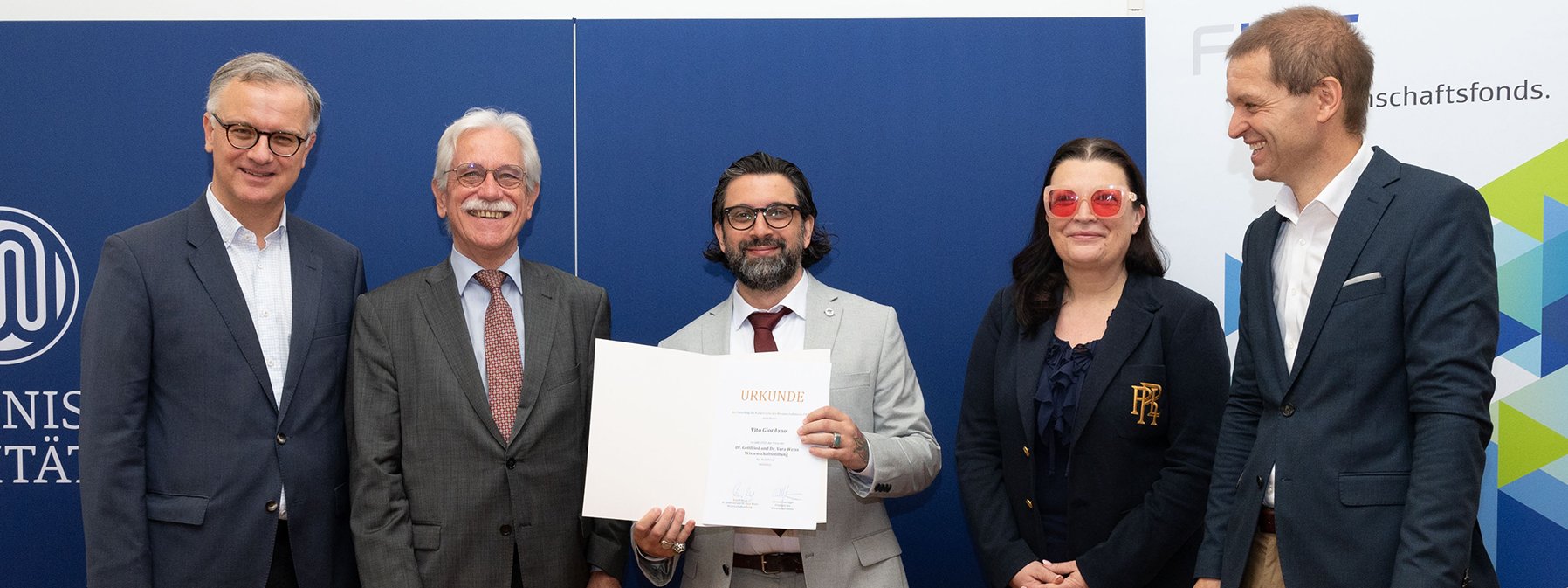
(Vienna, 02 June 2022) Vito Giordano from the Medical University of Vienna has been awarded the Weiss Prize, Austria's most valuable and privately funded research award in the field of anaesthesiology. Awarded through the Austrian Science Fund FWF, the €210,000 award from the Weiss Science Foundation will enable the neuroscientist to conduct a three-year research project aimed at improving the medical treatment of premature babies.
Neuroscientist Vito Giordano will conduct his three-year Weiss project at the Comprehensive Center for Pediatrics of MedUni Vienna and University Hospital Vienna at the Department of Pediatrics and Adolescent Medicine as part of the FWF's Clinical Research (KLIF) Programme.
Vito Giordano's research is focussed on the clinical and environmental factors that may influence brain development in premature babies, who are exposed to a variety of interventions throughout their stay in hospital. This may often involve the use of analgesics and sedatives to ensure that the babies are as comfortable as possible. However, the administration of such medications is complicated by the fact that babies are unable to express themselves verbally. While methods such as monitoring brain activity provide more information about the level of sedation, their evaluation is time-consuming and requires a lot of expertise. Vito Giordano's Weiss project will analyse and develop deep machine learning algorithms for interpreting brain activity associated with sedatives. The knowledge gained will help clinical teams to provide better care for the very youngest patients.
"I am delighted that the Weiss Foundation and the FWF are funding my clinical research project, which will provide important new insights into the medical treatment of premature babies," said Vito Giordano on being presented with the award. "Extremely accurate clinical assessments are particularly important during the baby stage. The more precisely we can determine the duration and administration of sedation going forward, the better it will be for the babies," he explains.
"On behalf of the Weiss Science Foundation, may I offer my sincere congratulations to Vito Giordano for receiving the Weiss Prize in the field of anaesthesiology. Every year, Dr Putz and I are delighted to see how the intention of the founding couple - to promote science in their two fields of expertise, meteorology and anaesthesiology - is so impressively fulfilled," said Rudolf Bauer, Chairman of the "Dr Gottfried and Dr Vera Weiss Science Foundation".
"We are proud of Vito Giordano's achievements and, on behalf of MedUni Vienna, I would like to thank the Weiss Foundation and the FWF for this award. Interdisciplinary approaches are particularly important in the field of research relating to premature babies. Few grants are available for this area of medicine, which is why we are delighted that a member of MedUni Vienna's Comprehensive Center for Pediatrics is able to accept this award," said Markus Müller, Rector of MedUni Vienna.
"Collaboration with the Weiss Foundation and also with the FWF's alpha+ Foundation is of huge importance for the creation and reinforcement of a philanthropic culture in the field of science and research in Austria. May I thank the Weiss Science Foundation for its confidence in the FWF and wish Vito Giordano every success in his project," said FWF President Christof Gattringer in his congratulatory remarks. "Clinical research on patients is already challenging. When you add to that the challenge of dealing with preverbal premature babies, a great deal of experience and expertise is required. The project will make a major contribution in terms of improving the well-being of babies during interventions performed in clinical practice", Gattringer concluded.